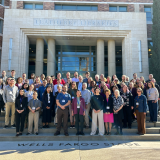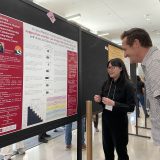Big Data Is Changing Healthcare
May 29, 2014
This article, written by David Ogul, originally appeared on the Los Angeles Times website.
There’s a lot of information out there about healthcare – an estimated 500 petabytes’ worth of data that could hold the key to better diagnoses and even better treatment of everything from Alzheimer’s disease and cancer to diabetes. The question is, how do you unlock the answers hidden within?
Chapman University is taking on the challenges of “big data” – meaning any data set so big that commonly used software can’t store and analyze it all – with one goal in mind: better health care for all.
At the School of Computational Sciences at Chapman’s Schmid College of Science and Technology, Assistant Professor Erik Linstead and his students have developed an app to help parents mine big data to more effectively deal with children living with autism spectrum disorders. And at the Wilkinson College of Humanities and Social Sciences, Assistant Professor Kerk Kee has secured a $325,000 federal grant to study how scientists develop and use new computational tools to analyze big data.
“We generate a heck of a lot of data and there is a lot of interesting information in that data, but you have to develop effective techniques to examine and analyze what’s there to make it useful,” Linstead said. “Everyone is so plugged in right now. There is so much information out there. It’s just a matter of capturing it, analyzing it and using it effectively.”
For example: What treatments are most effective for any particular condition? Are there any patterns to a drug’s side effects or to hospital admissions? Are there more cost-effective ways to treat any specific condition? Researchers who know how to mine big data are poised to answer all those questions and more.
Chapman University partnered with the Virginia-based Interface Foundation of North America to hold the 44th Symposium on the Interface of Computing Science and Statistics that looked at the latest trends in data handling. The symposium welcomed scientific contributions in data science theory and practice, earth systems science and healthcare data systems dealing with big data to advance core scientific and technological means of managing, analyzing, visualizing and extracting useful information from large and diverse data sets.
“I feel like Chapman is ahead of the curve,” said Dr. Cyril Rakovski, an assistant professor at the Schmid College of Science and Technology, who sees a time in the not-too-distant future where smart devices can check an array of vital signs, continuously collect data on other health characteristics and make precise diagnosis in real time.
“Big Data will result in an amazing jump in efficiency and correct diagnosis,” he said. “A lot of mystery, a lot of guessing, will be removed.”


